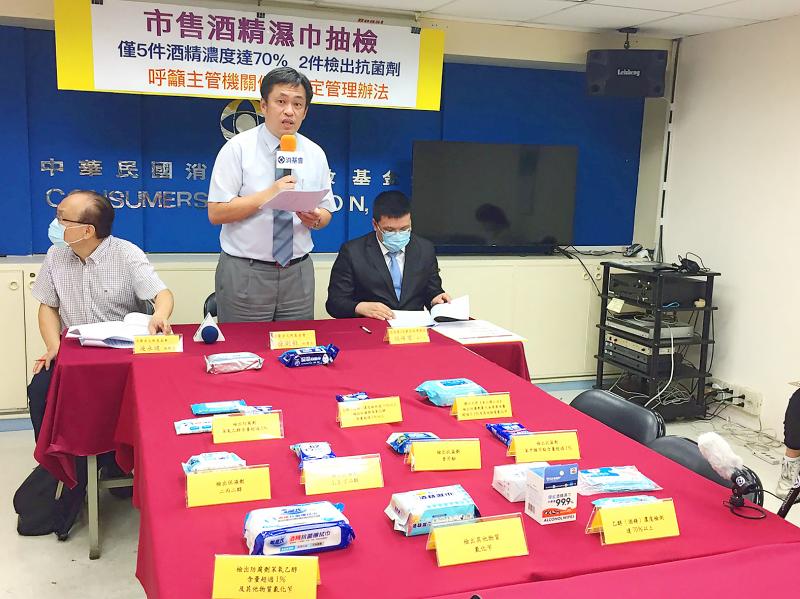The Consumers’ Foundation on Monday called on the government to set standards for alcohol wipes sold in the nation, as only five of the 17 brands of wipes it tested met the recommended alcohol concentration needed to wipe out bacteria.
Products such as alcohol wipes have seen a surge in popularity amid the COVID-19 pandemic, but consumers have expressed their doubts to the foundation that the wipes actually kill bacteria, foundation secretary-general Hsu Tse-yu (徐則鈺) said.
To investigate the issue, the foundation randomly purchased 17 brands of wipes that contain ethanol sold at supermarkets, pharmacies and e-commerce sites in October last year and tested their alcohol levels, Hsu said.

Photo: CNA
Only five of the products met the 70 to 78 percent alcohol concentration needed to kill 99 percent of bacteria, Hsu said.
Three of the products had alcohol concentration levels of 60 to 69 percent, while the remaining nine had less than 50 percent concentrations, Hsu said.
However, the manufacturers cannot be fined because the government has not set a standard for alcohol concentration in wipes.
There is no definition of the term “anti-bacterial,” either, so products can be marketed as such even if they cannot kill bacteria effectively, Hsu said.
Besides alcohol levels, the foundation also tested the products for preservatives using the standard set for cosmetics, as there are no regulations for alcohol wipes.
Five alcohol wipes had phenoxyethanol levels higher than 1 percent, the standard set for cosmetic products, while one contained more than 0.1 percent of benzethonium chloride, Hsu said.
The foundation called on the government to set standards for alcohol wipes and a definition for the term “antibacterial,” so that manufacturers and consumers would have clear rules to follow, Hsu said.

The inspection equipment and data transmission system for new robotic dogs that Taipei is planning to use for sidewalk patrols were developed by a Taiwanese company, the city’s New Construction Office said today, dismissing concerns that the China-made robots could pose a security risk. The city is bringing in smart robotic dogs to help with sidewalk inspections, Taipei Deputy Mayor Lee Ssu-chuan (李四川) said on Facebook. Equipped with a panoramic surveillance system, the robots would be able to automatically flag problems and easily navigate narrow sidewalks, making inspections faster and more accurate, Lee said. By collecting more accurate data, they would help Taipei

STATS: Taiwan’s average life expectancy of 80.77 years was lower than that of Japan, Singapore and South Korea, but higher than in China, Malaysia and Indonesia Taiwan’s average life expectancy last year increased to 80.77 years, but was still not back to its pre-COVID-19 pandemic peak of 81.32 years in 2020, the Ministry of the Interior said yesterday. The average life expectancy last year increased the 0.54 years from 2023, the ministry said in a statement. For men and women, the average life expectancy last year was 77.42 years and 84.30 years respectively, up 0.48 years and 0.56 years from the previous year. Taiwan’s average life expectancy peaked at 81.32 years in 2020, as the nation was relatively unaffected by the pandemic that year. The metric

TAKING STOCK: The USMC is rebuilding a once-abandoned airfield in Palau to support large-scale ground operations as China’s missile range grows, Naval News reported The US Marine Corps (USMC) is considering new sites for stockpiling equipment in the West Pacific to harden military supply chains and enhance mobility across the Indo-Pacific region, US-based Naval News reported on Saturday. The proposed sites in Palau — one of Taiwan’s diplomatic allies — and Australia would enable a “rapid standup of stored equipment within a year” of the program’s approval, the report said, citing documents published by the USMC last month. In Palau, the service is rebuilding a formerly abandoned World War II-era airfield and establishing ancillary structures to support large-scale ground operations “as China’s missile range and magazine

Passengers on Taiwan High Speed Rail (THSR) will be required to use headphones and make phone calls in gangways under new “quiet travel” rules starting Sept. 22. THSR Chairman Shih Che (史哲) told media that THSR will run a three-month promotional campaign to ensure widespread adoption of the new rules. Those repeatedly ignoring the guidance face the potential termination of their transport contract, which can result in them getting escorted off the train, according to THSR. Shih shared his hope to cultivate an environment conducive to rest and reading for the train’s passengers, stating that these changes aim to “promote self-discipline” among passengers